Interview: Four Female Directors Share Their Personal Histories Within THE ZIP CODE PLAYS: SEASON TWO by Antaeus Theatre Company
Gigi Bermingham, Jennifer Chang, Saundra McClain, and Bernadette Speakes
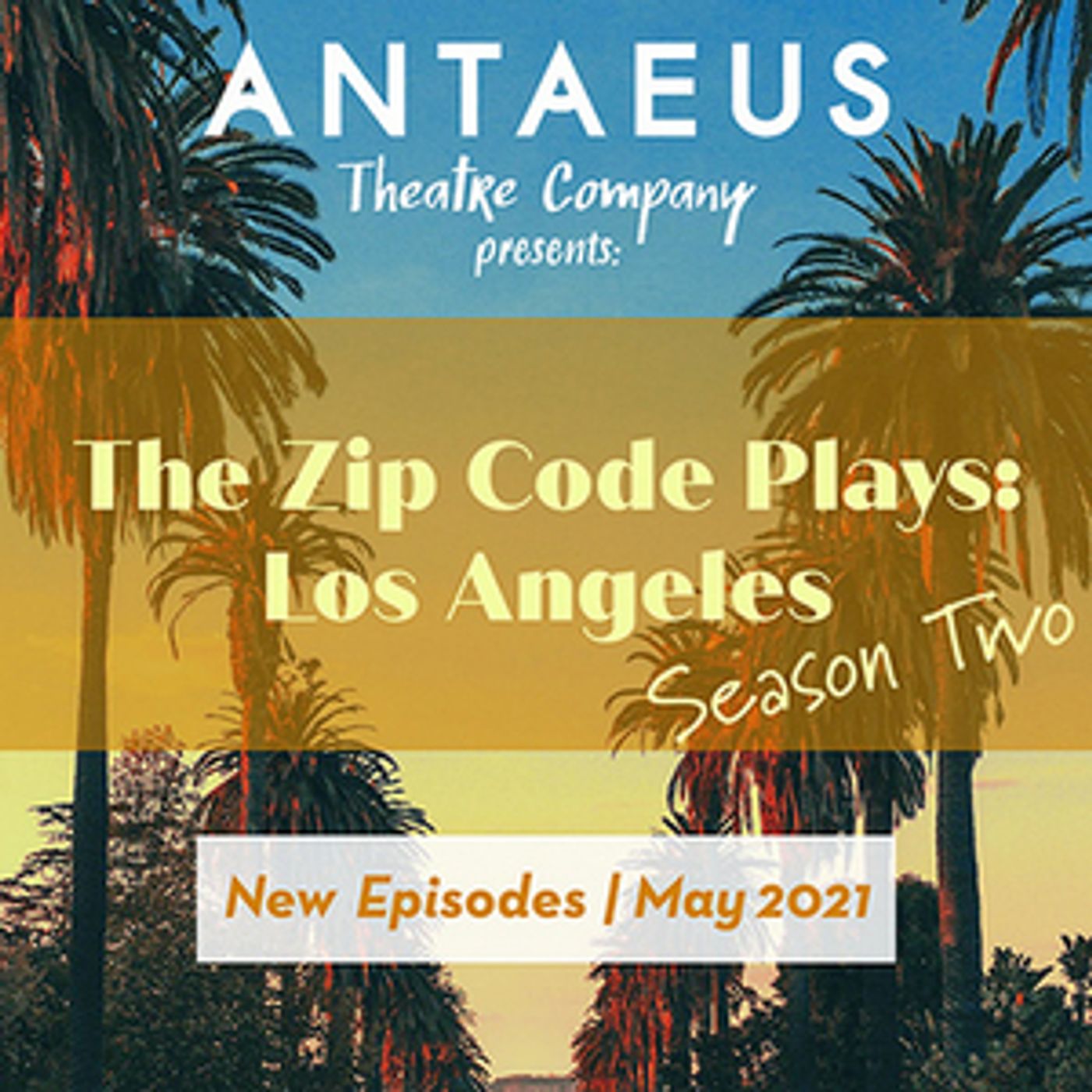
Antaeus Theatre Company highlights the culture and history of six additional Los Angeles neighborhoods with Season Two of its popular "The Zip Code Plays: Los Angeles" podcast series, set to launch May 20. Over 45,000 Season One listeners (including me!) were transported to South Central L.A. (90011), Downtown L.A. (90012), Westwood (90024), Pacific Palisades (90272), Santa Monica (90403) and Sun Valley (91352). And I certainly learned many new facts about each of those locations, even though I am a Los Angeles native! Truly it is a city of individual communities with personalities all their own.
So now I am excited to listen to Season Two which will introduce audiences to the geographically, historically and culturally diverse locales of Echo Park (90026), West Hollywood (90069), Inglewood (90303), Pacoima (91331), North Hollywood (91601) and Monterey Park (91754). To find out a bit more about these areas, I spoke with each of the four female directors about their personal knowledge and insights into their Zip Code episode.
 90026: Echo Park, "$10 and a Tambourine" takes us to the Angelus Temple, the Pentecostal megachurch built in 1923 at the north end of Echo Lake by famed evangelist Aimee Semple McPherson. Religion, power and celebrity are all up for grabs in this peek into the city's early days. McPherson (played by Eve Gordon) is forced to defend her past, her present and the future of Los Angeles itself when she entertains two visitors - one alive (Mike McShane as William Mulholland, chief engineer of the Bureau of Water and Supply) and one dead (Leonard Earl Howze as William J. Seymour, the African American holiness preacher who first invited McPherson to L.A.) in this compelling play by Mildred Inez Lewis. I spoke with director Gigi Bermingham (pictured) about this zip code episode.
90026: Echo Park, "$10 and a Tambourine" takes us to the Angelus Temple, the Pentecostal megachurch built in 1923 at the north end of Echo Lake by famed evangelist Aimee Semple McPherson. Religion, power and celebrity are all up for grabs in this peek into the city's early days. McPherson (played by Eve Gordon) is forced to defend her past, her present and the future of Los Angeles itself when she entertains two visitors - one alive (Mike McShane as William Mulholland, chief engineer of the Bureau of Water and Supply) and one dead (Leonard Earl Howze as William J. Seymour, the African American holiness preacher who first invited McPherson to L.A.) in this compelling play by Mildred Inez Lewis. I spoke with director Gigi Bermingham (pictured) about this zip code episode.
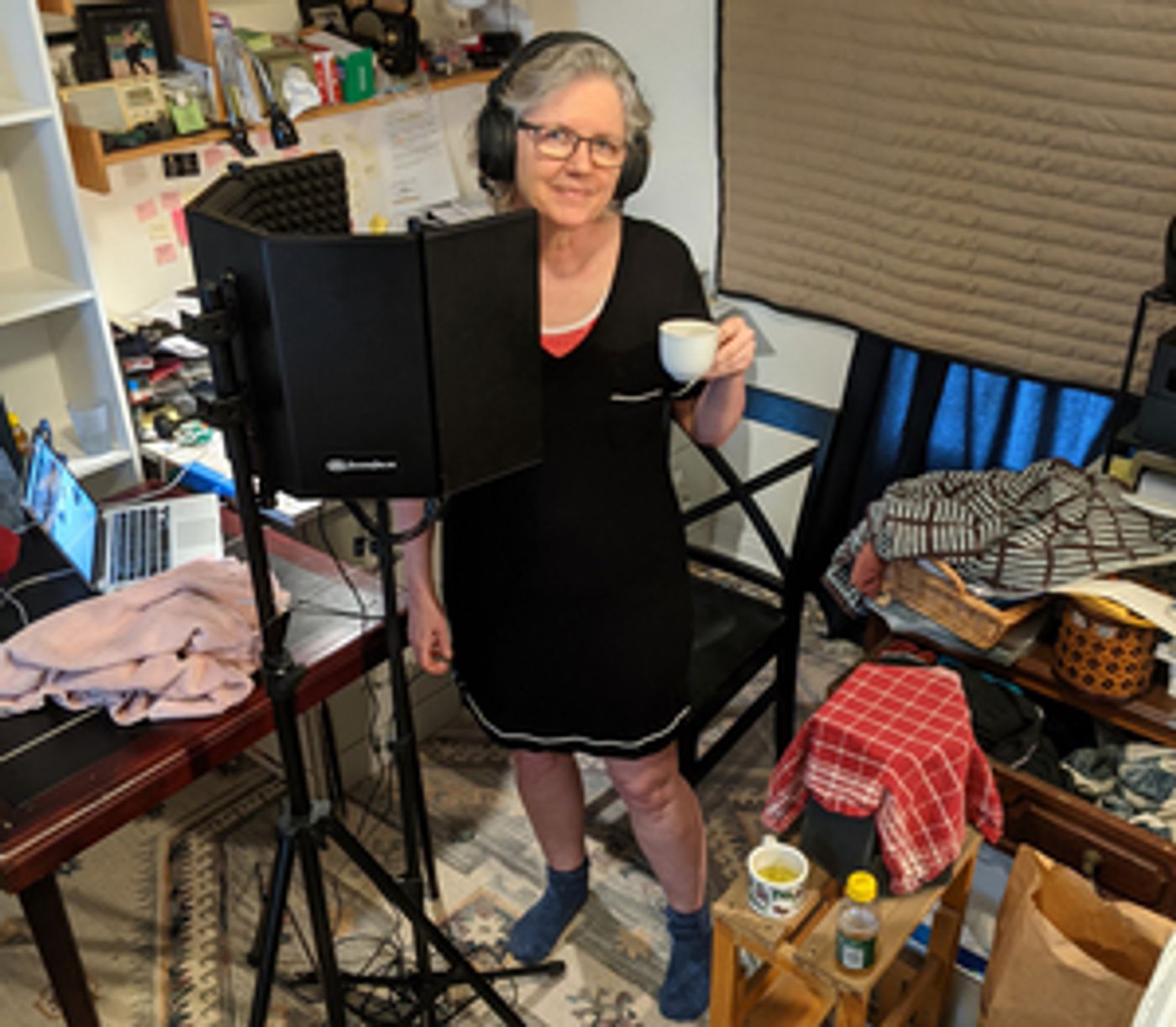 (Pictured) Eve Gordon records 90026: Echo Park, "$10 and a Tambourine" - Photo courtesy Antaeus Theatre Company
(Pictured) Eve Gordon records 90026: Echo Park, "$10 and a Tambourine" - Photo courtesy Antaeus Theatre Company
(Shari) How or why did you get involved with the play about this zip code? Do you currently or have you ever lived or worked within it so you have a personal knowledge of the area?
(Gigi): Echo Park holds a special place in my heart because I spent a lot of time there in the 1990s. Most of my friends lived there when I first arrived in L.A., and we enjoyed its beauty and eclectic vibe rich with artistic offerings and offbeat, hole-in-the-wall restaurants and a general atmosphere of hope and positivity.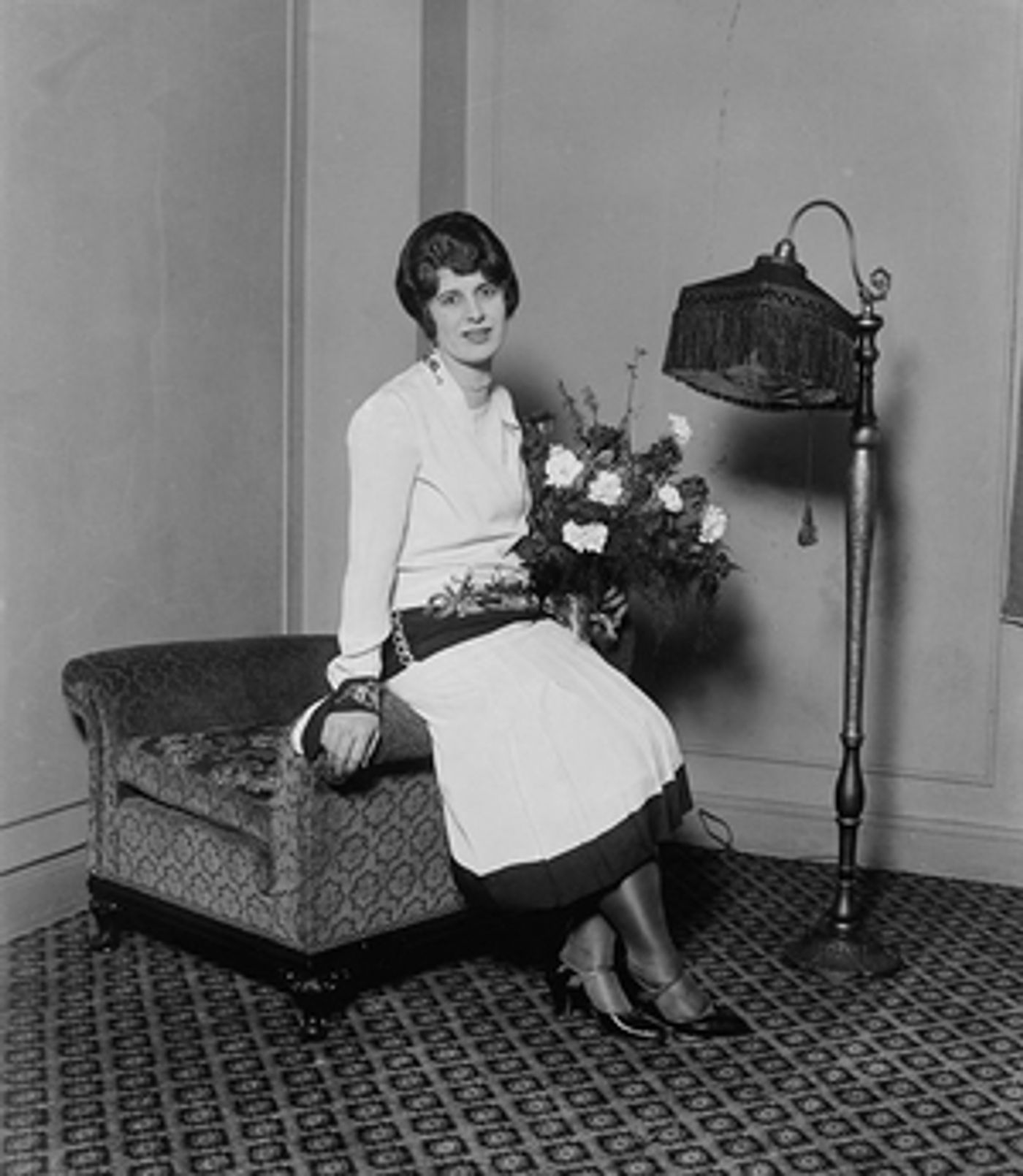 (Shari) What is it about the history of this area discussed in this play that makes it so different from other parts of Los Angeles?
(Shari) What is it about the history of this area discussed in this play that makes it so different from other parts of Los Angeles?
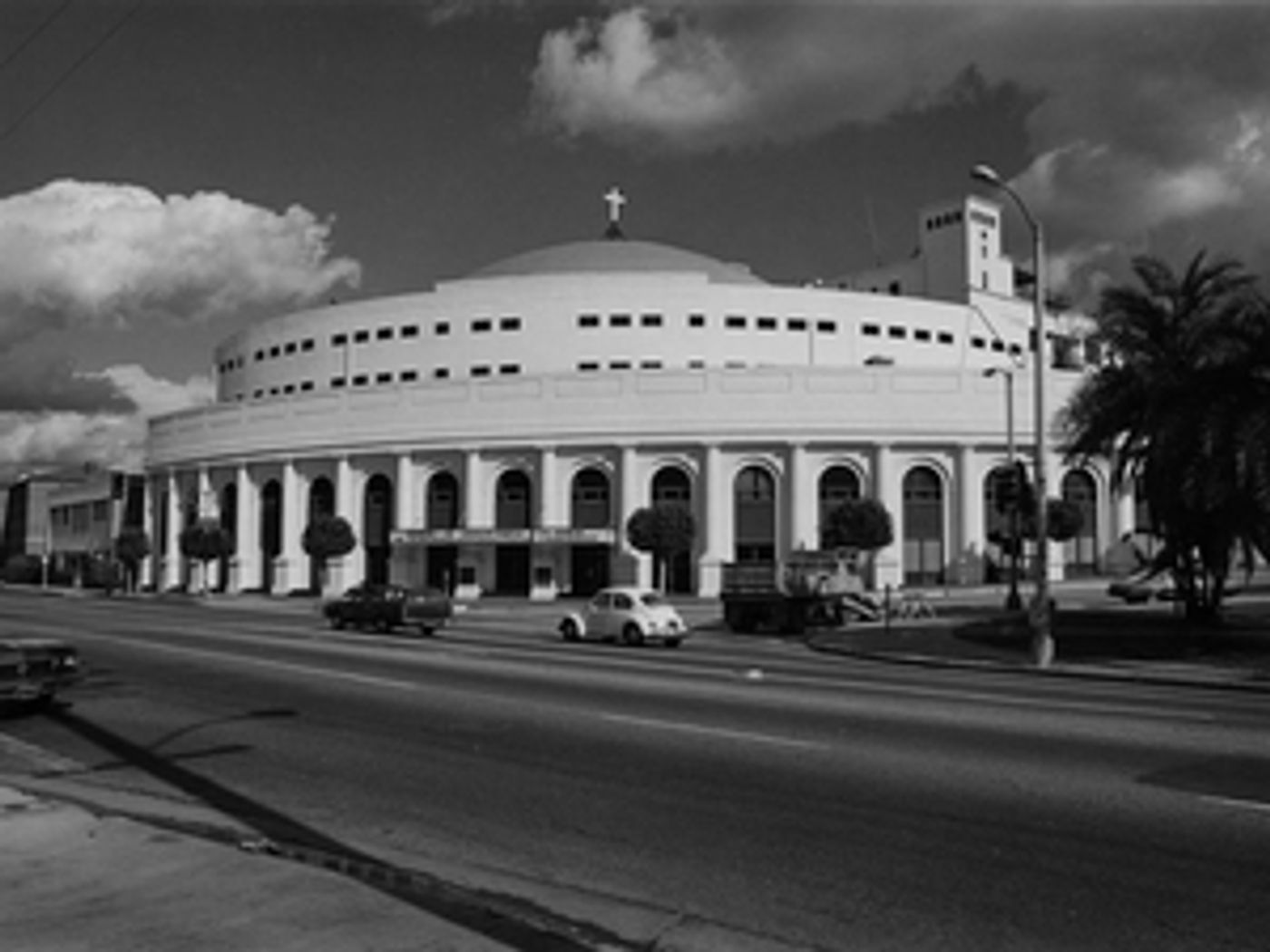 (Shari): What information do you think audience members should know about the area and/or the interactions between Aimee Semple McPherson and her Angelus Temple, William Mulholland, and William J. Seymour before they watch the show?
(Shari): What information do you think audience members should know about the area and/or the interactions between Aimee Semple McPherson and her Angelus Temple, William Mulholland, and William J. Seymour before they watch the show?
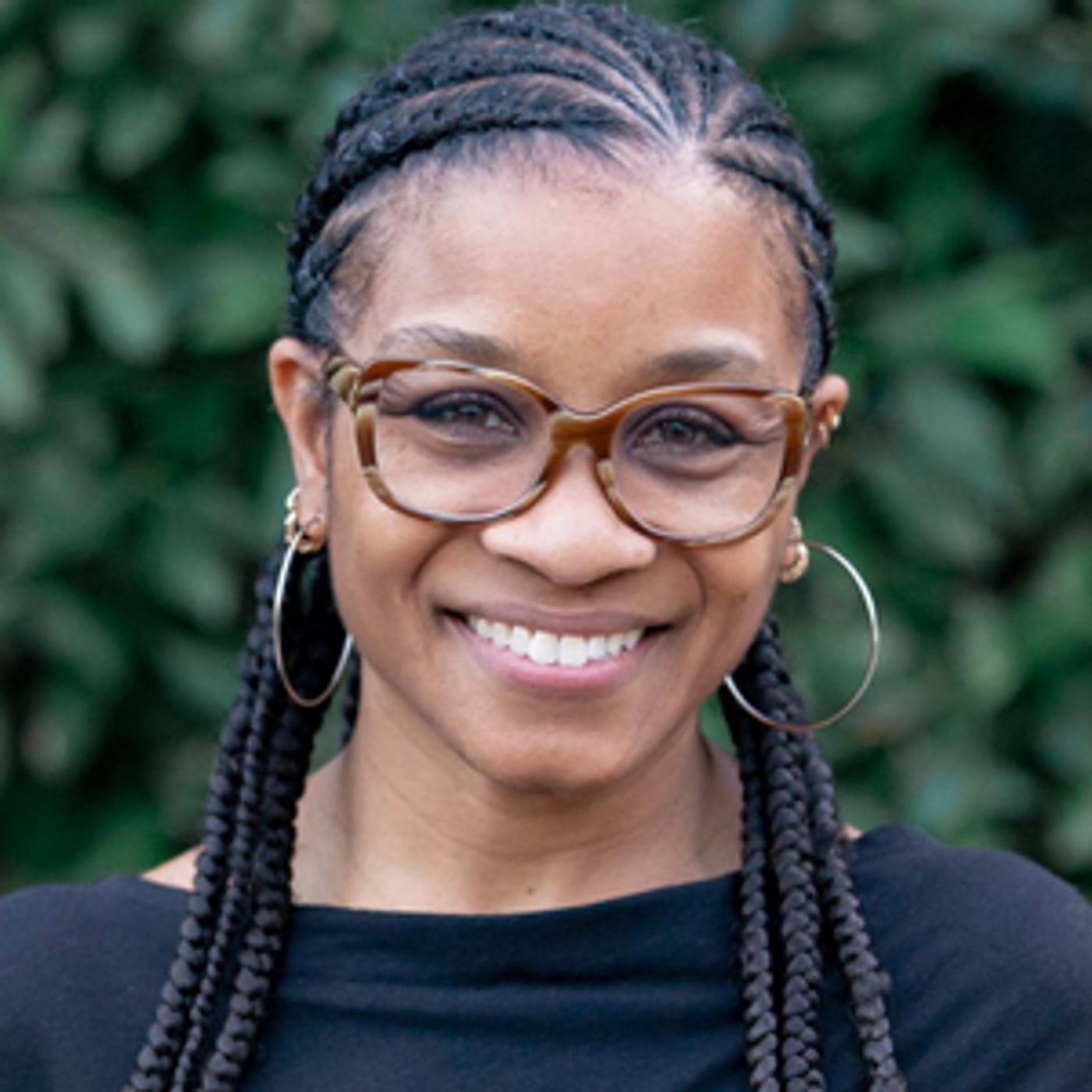 Hollywood Park Racetrack is about to close its doors forever in 90303: Inglewood, "The Vig" written by Paula Cizmar. But that doesn't stop new-to-town Lina from searching for a long lost relative - with nothing but a yellowing Polaroid and an old tip sheet. The odds for the future are long in this look at the dreams that drive people to reinvent themselves in the City of Angels. Featuring Ellis Greer, Don R. McManus and Keiana Richàrd, here is what director Bernadette Speakes (pictured) shared with me about Zip Code 90303.
Hollywood Park Racetrack is about to close its doors forever in 90303: Inglewood, "The Vig" written by Paula Cizmar. But that doesn't stop new-to-town Lina from searching for a long lost relative - with nothing but a yellowing Polaroid and an old tip sheet. The odds for the future are long in this look at the dreams that drive people to reinvent themselves in the City of Angels. Featuring Ellis Greer, Don R. McManus and Keiana Richàrd, here is what director Bernadette Speakes (pictured) shared with me about Zip Code 90303.
(Shari): As a graduate of Inglewood High School, I am very familiar with all the changes that have taken place in this zip code in the past 50 years since I was a student there. Do you currently or have you ever lived or worked within it so you have a personal knowledge of the area that led you to want to direct this play?
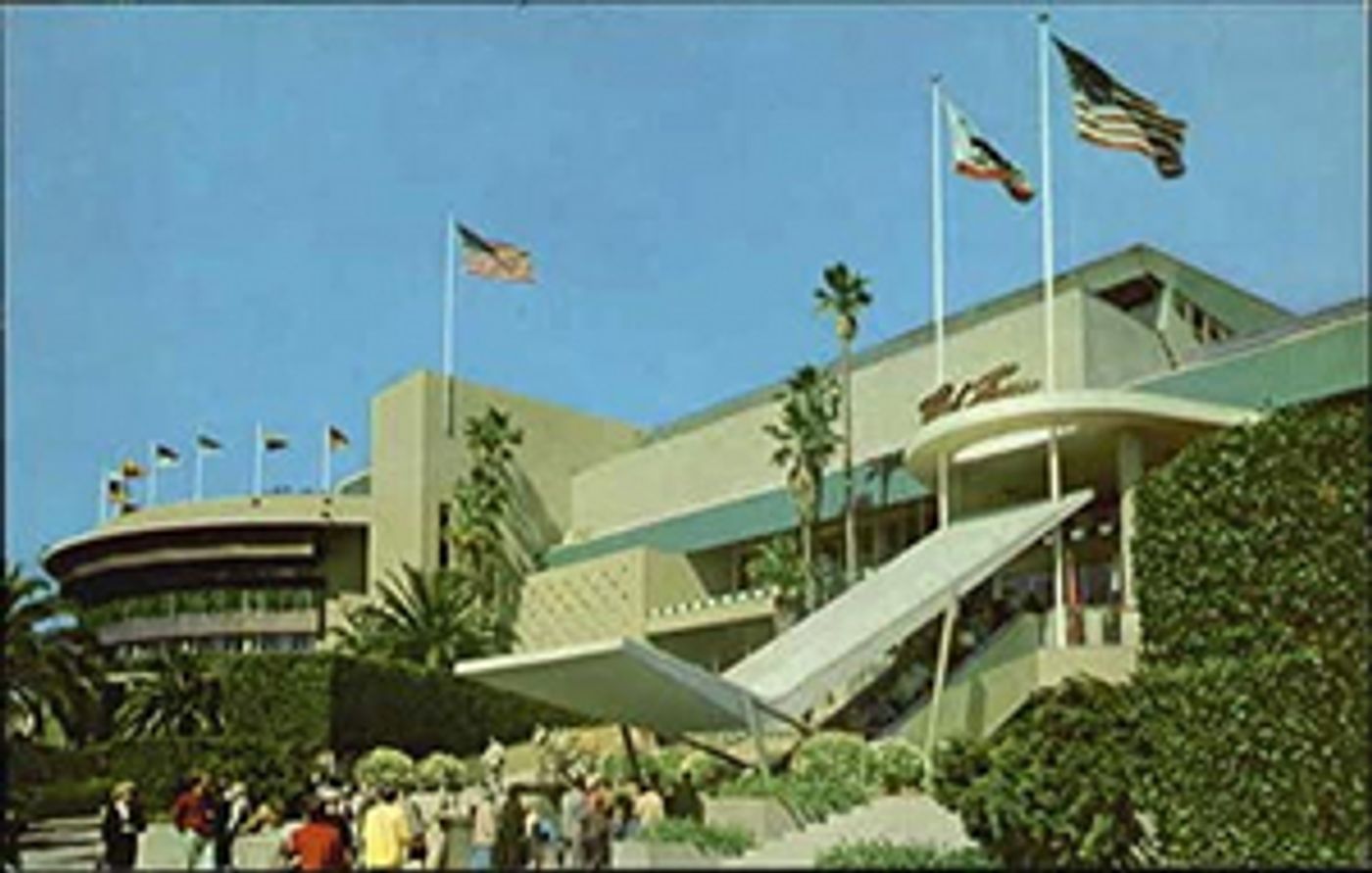 (Bernadette): I'm originally from Chicago, and I moved to California in the summer 1997. In March of 1998 is when I heard of Hollywood Park Racetrack (pictured). I had never been to a race track and I went there on a date. It was the best experience! My heart was pounding. I was yelling and screaming for the horses, watching the jockeys maneuver around the track and all the people being so involved. It was a blast.
(Bernadette): I'm originally from Chicago, and I moved to California in the summer 1997. In March of 1998 is when I heard of Hollywood Park Racetrack (pictured). I had never been to a race track and I went there on a date. It was the best experience! My heart was pounding. I was yelling and screaming for the horses, watching the jockeys maneuver around the track and all the people being so involved. It was a blast.
(Shari): Since you not familiar with the area in that zip code, other than visiting the track, did you tour the area to become familiar with its neighborhoods, concerns, and all the new growth going on, especially around the new SoFi stadium, which is replacing the Hollywood Park Racetrack, and Metrolink train stations going in and the redesign of the downtown area? What did you learn about the area which is reflected in the play?
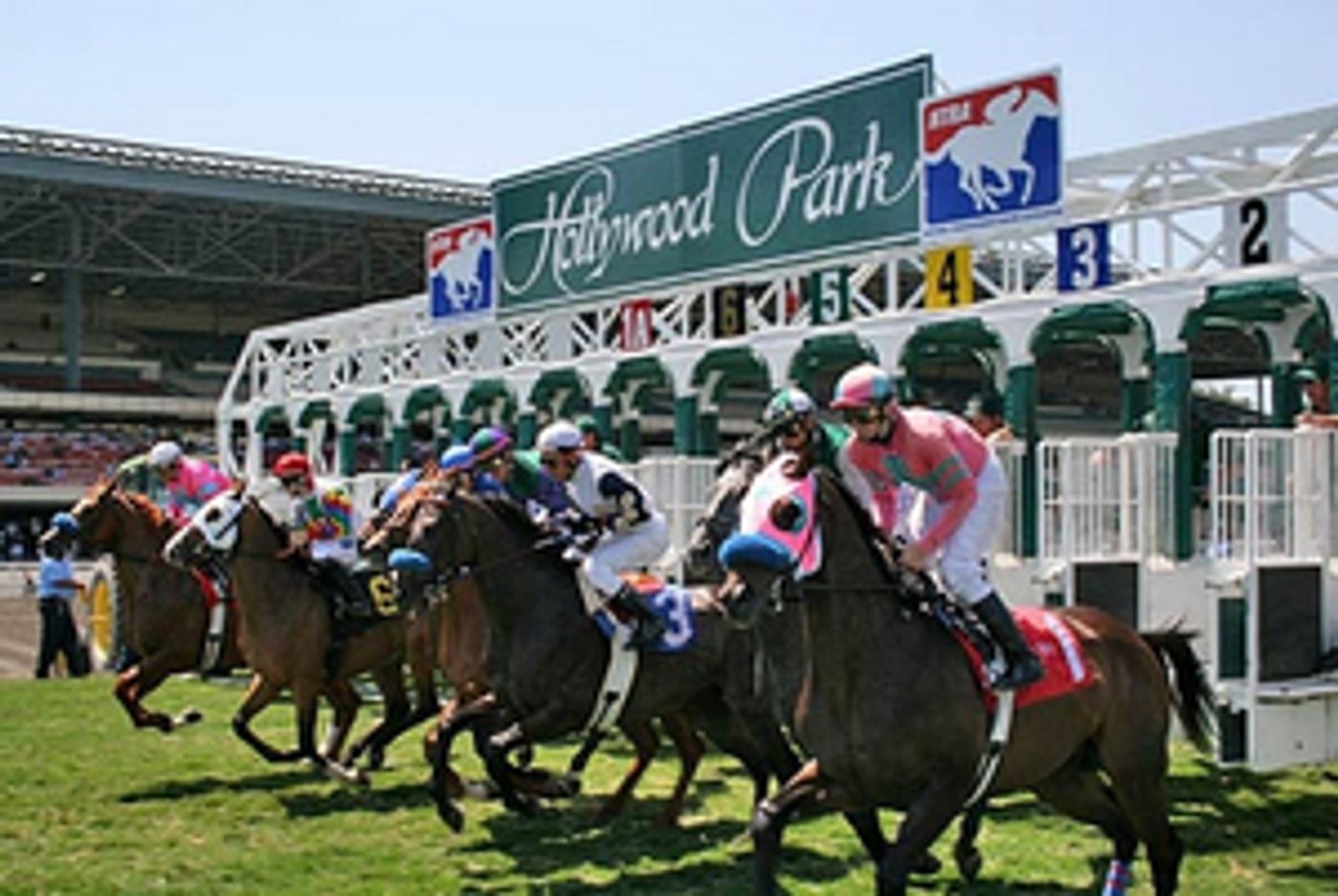 (Bernadette): I didn't go back again, but I did listen to Todd Betfair's "sign-off" speech which was heartbreaking to hear. Gentrification is positive in so many ways - giving a facelift to a community, providing more opportunities for people to have jobs, but it also wipes out (physically) the history of a neighborhood. I grew up in a neighborhood called "Hyde Park," in Chicago, where many POC had their own stores, novelty shops, restaurants. But eventually the University of Chicago began to buy up a lot of the property and it resulted into becoming a community I no longer recognized. The remnants left in my old neighborhood and those of Inglewood are only the memories of those who lived there in those neighborhoods. Hollywood Park was a staple in the Inglewood community.
(Bernadette): I didn't go back again, but I did listen to Todd Betfair's "sign-off" speech which was heartbreaking to hear. Gentrification is positive in so many ways - giving a facelift to a community, providing more opportunities for people to have jobs, but it also wipes out (physically) the history of a neighborhood. I grew up in a neighborhood called "Hyde Park," in Chicago, where many POC had their own stores, novelty shops, restaurants. But eventually the University of Chicago began to buy up a lot of the property and it resulted into becoming a community I no longer recognized. The remnants left in my old neighborhood and those of Inglewood are only the memories of those who lived there in those neighborhoods. Hollywood Park was a staple in the Inglewood community.
(Shari): I do admit that I learned to drive in the enormous Hollywood Park parking lot during my driver's ed class! What do you think it is about the history of this area that makes it so different from other parts of Los Angeles?
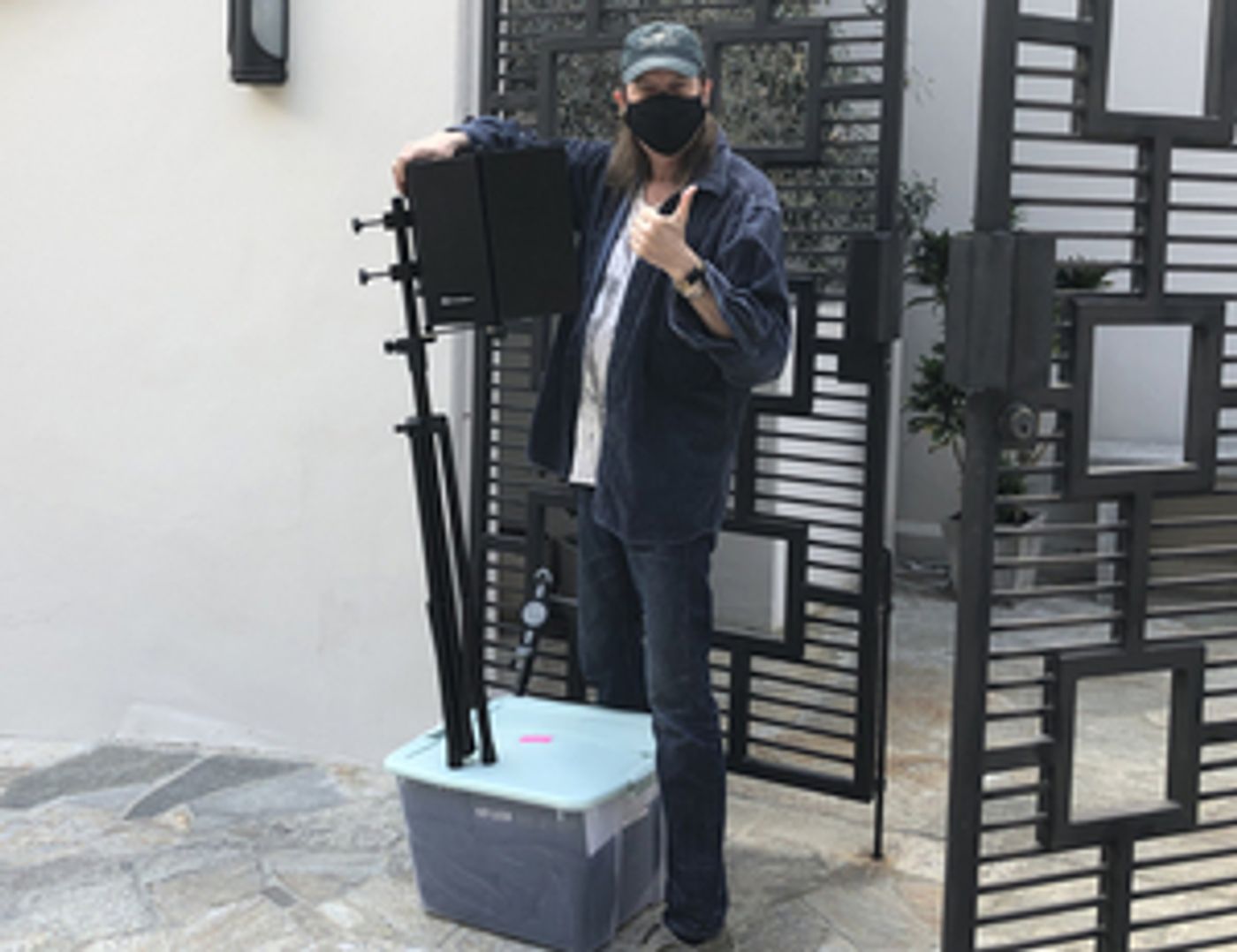 (Pictured) Don R. McManus receives his mobile recording kit to record his part in 90303: Inglewood, "The Vig" Photo courtesy: Antaeus Theatre Company
(Pictured) Don R. McManus receives his mobile recording kit to record his part in 90303: Inglewood, "The Vig" Photo courtesy: Antaeus Theatre Company
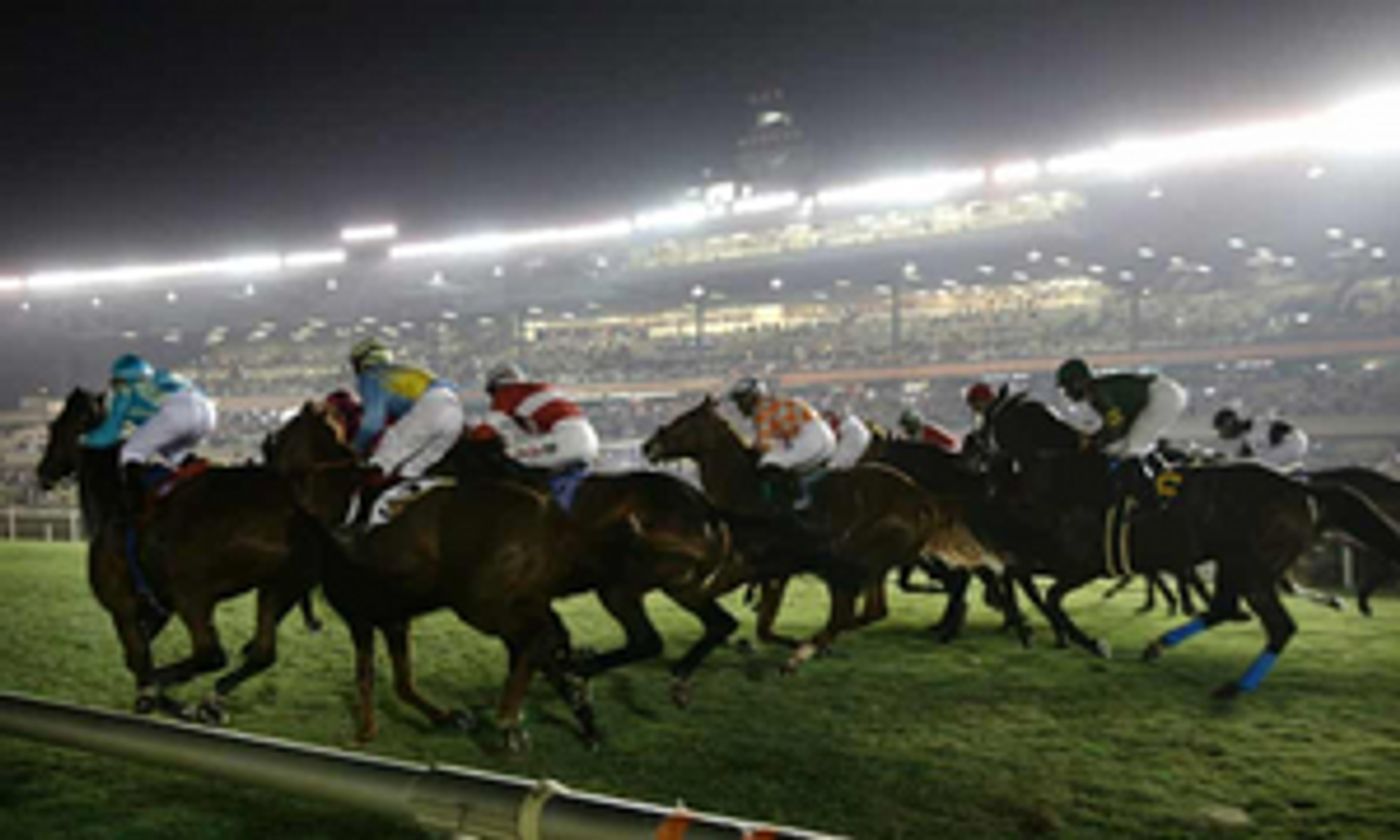 Some of the things I didn't know were famous horses like Seabiscuit or Seattle Slew raced this track! That blew my mind. So, I choose to tell this story so people can take a step back into a time and place which was so prevalent to the 90303 communities, it allows them to recall meaningful memories, and unforgettable moments which will carry on forever.
Thank you for this opportunity to answer these questions! I can't wait for everyone to hear this radio play!
Some of the things I didn't know were famous horses like Seabiscuit or Seattle Slew raced this track! That blew my mind. So, I choose to tell this story so people can take a step back into a time and place which was so prevalent to the 90303 communities, it allows them to recall meaningful memories, and unforgettable moments which will carry on forever.
Thank you for this opportunity to answer these questions! I can't wait for everyone to hear this radio play!
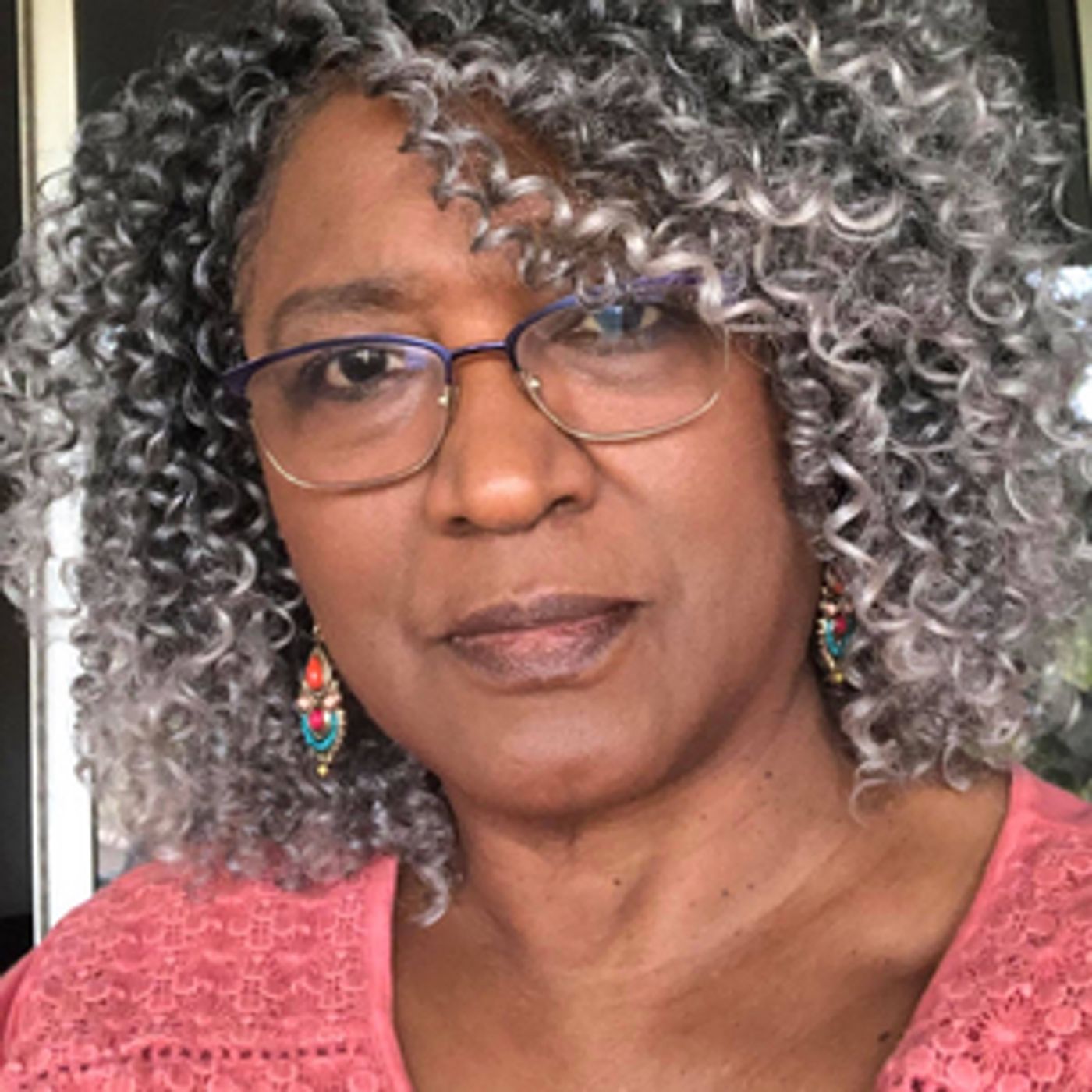 Fascinating, little-known historical facts about 91331: Pacoima come to light in "Gold & Shine," written by Khari Wyatt. See what happens when a university professor stung by professional disappointment has a chance encounter with an old man and his mule that pushes her into a thrilling storm of family revelations, haunting visions and altered realities, where she discovers an answer to the question, "What do we owe to the past?" With Tamika Katon-Donegal, Dale E. Turner and Karen Malina White. Here is what director Saundra McClain (pictured) shared with me about 91331.
Fascinating, little-known historical facts about 91331: Pacoima come to light in "Gold & Shine," written by Khari Wyatt. See what happens when a university professor stung by professional disappointment has a chance encounter with an old man and his mule that pushes her into a thrilling storm of family revelations, haunting visions and altered realities, where she discovers an answer to the question, "What do we owe to the past?" With Tamika Katon-Donegal, Dale E. Turner and Karen Malina White. Here is what director Saundra McClain (pictured) shared with me about 91331.
(Shari): How or why did you get involved with the play about this zip code? Do you currently or have you ever lived or worked within it so you have a personal knowledge of the area?
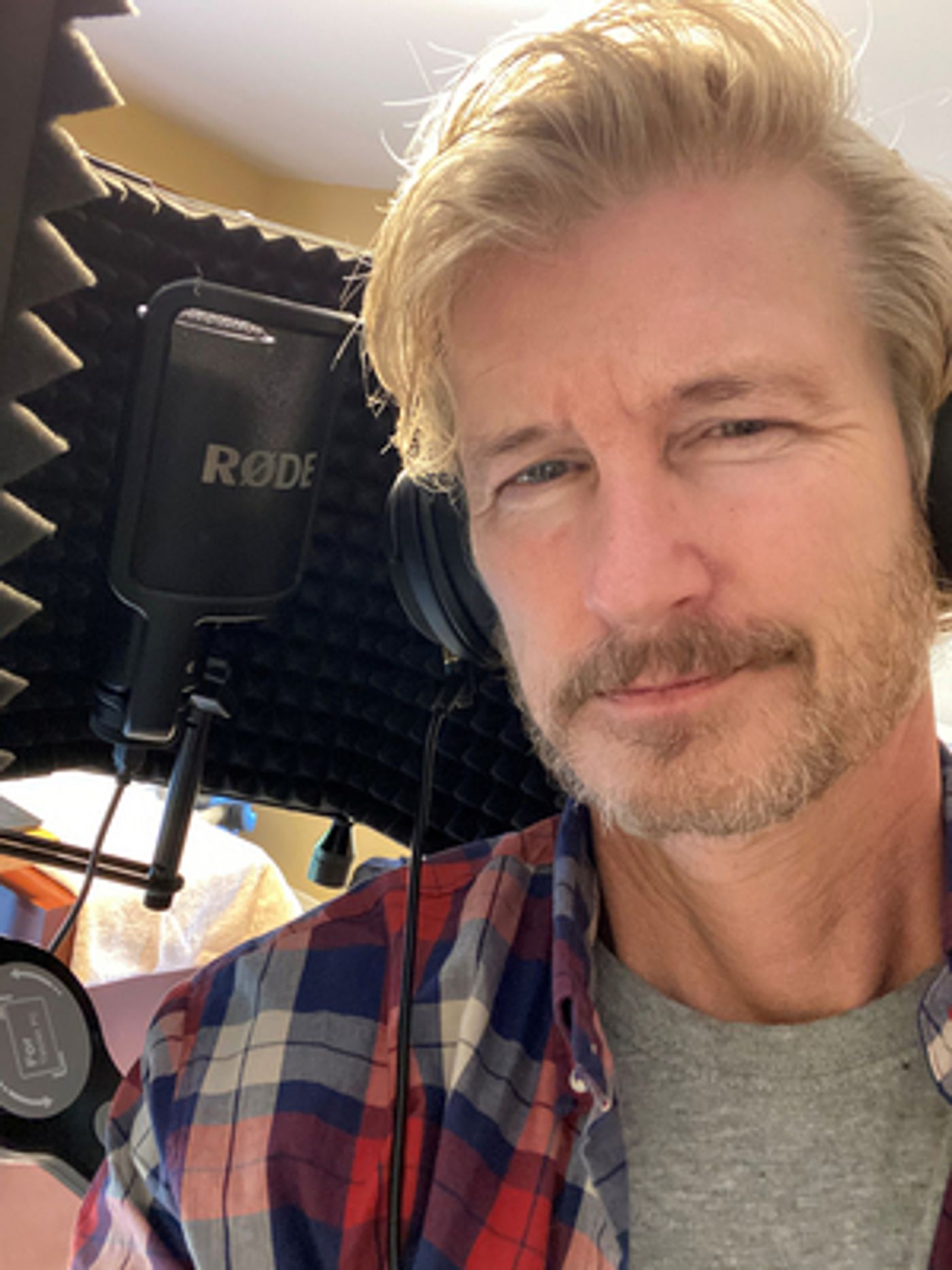 (Saundra): [Antaeus co-artistic director] Bill Brochtrup (pictured, who appears in 90069: West Hollywood ) asked me to direct it. I have never directed a radio play before, and thought it would be an interesting experience and my entree back into the fold of Antaeus. And no, I have never lived or worked in Pacoima.(Shari): What is it about the history of this area discussed in this play that makes it so different from other parts of Los Angeles?(Saundra): Most people don't know that gold was discovered in this part of California, in Apple Valley to be exact, before the Gold Rush up north. If you are from other parts of the USA, not much is taught or known about California's history outside that of the Gold Rush in the 19th Century and I believe the airplane industry prior to WW2, and of course the silent film studios and the massive migration of Hollywood hopefuls...not to mention, the weather.
(Saundra): [Antaeus co-artistic director] Bill Brochtrup (pictured, who appears in 90069: West Hollywood ) asked me to direct it. I have never directed a radio play before, and thought it would be an interesting experience and my entree back into the fold of Antaeus. And no, I have never lived or worked in Pacoima.(Shari): What is it about the history of this area discussed in this play that makes it so different from other parts of Los Angeles?(Saundra): Most people don't know that gold was discovered in this part of California, in Apple Valley to be exact, before the Gold Rush up north. If you are from other parts of the USA, not much is taught or known about California's history outside that of the Gold Rush in the 19th Century and I believe the airplane industry prior to WW2, and of course the silent film studios and the massive migration of Hollywood hopefuls...not to mention, the weather.
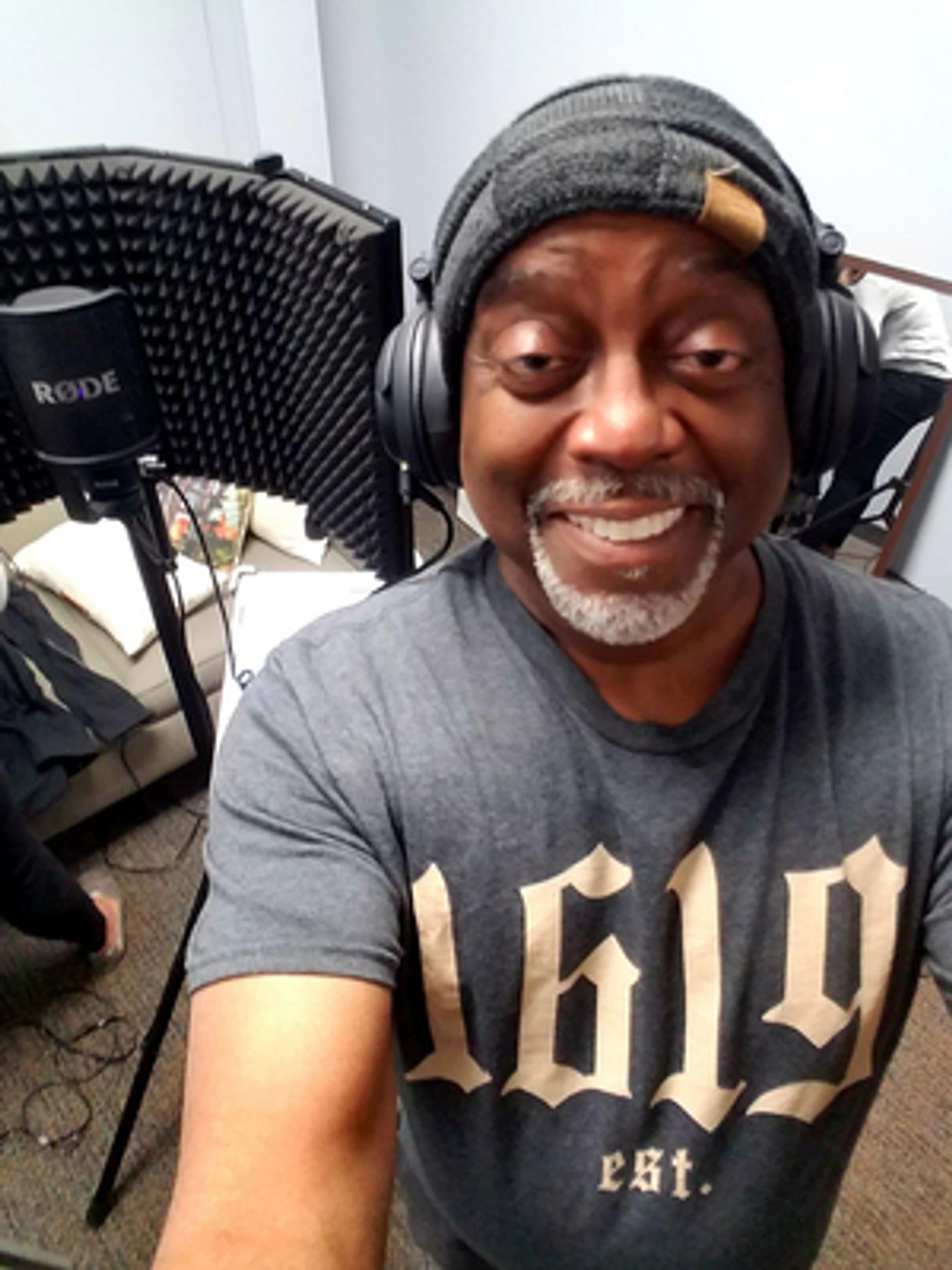 (Pictured) Dale E. Turner records 91331: Pacoima "Gold & Shine" - Photo courtesy Antaeus Theatre Company
(Pictured) Dale E. Turner records 91331: Pacoima "Gold & Shine" - Photo courtesy Antaeus Theatre Company
However, Pacoima is probably the least glamorous section in the Valley. I think I have only been in the area 3 or 4 times since I moved out here in 2006.
(Shari): That's very true. As far as I know, Pacoima has a reputation for being the center of auto dismantlers in the San Fernando Valley and not much else. But in this play, a lot of little-know historical facts about it are presented. Which of those did you find the most illuminating about the area that are reflected in it?
(Saundra): That there was gold...and that the character of Sampson came as a slave prior from the Civil War and worked the gold fields. The last stop on the journey is a visit to 91754: Monterey Park, the first city in the Continental United States with an Asian American majority, called the "nation's first suburban Chinatown" by the Los Angeles Times. In "Bingo Bitches," a raucous comedy by Elizabeth Wong, it's Bingo day at the local senior center, and Kwan Tai (Karen Huie) is introducing her old friend Wong Tai (Cici Lau) to the game and all of its rituals - including her lucky potato. But who will be the big winner when nemesis Mrs. Boodakian (Jade Hykush) turns up? Here is my interview with director Jennifer Chang (pictured) about Zip Code 91754:
The last stop on the journey is a visit to 91754: Monterey Park, the first city in the Continental United States with an Asian American majority, called the "nation's first suburban Chinatown" by the Los Angeles Times. In "Bingo Bitches," a raucous comedy by Elizabeth Wong, it's Bingo day at the local senior center, and Kwan Tai (Karen Huie) is introducing her old friend Wong Tai (Cici Lau) to the game and all of its rituals - including her lucky potato. But who will be the big winner when nemesis Mrs. Boodakian (Jade Hykush) turns up? Here is my interview with director Jennifer Chang (pictured) about Zip Code 91754:
(Shari): How or why did you get involved with the play about this zip code? Do you currently or have you ever lived or worked within it?
(Jennifer): I was lucky enough to be asked by Antaeus to direct "Bingo Bitches." The writer, Elizabeth Wong, was familiar with my work. I have spent quality time in Monterey Park - mostly eating! My husband's family is local to Los Angeles and the San Gabriel Valley, and they are in the restaurant business so they know where to eat!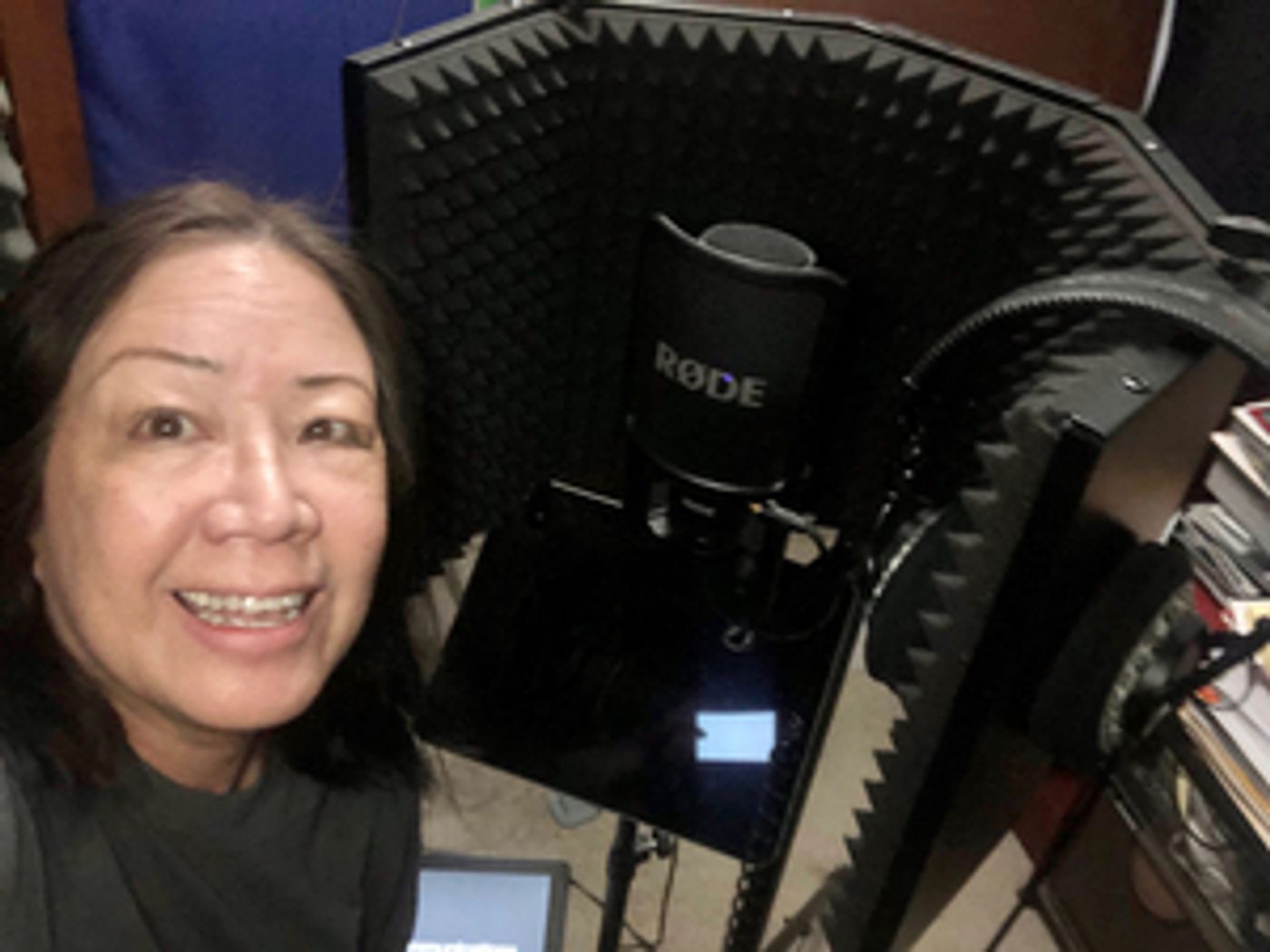 (Shari): I have to admit I know about the reputation for great restaurants in Monterey Park! What about your cast? Are they based within Monterey Park or know it well? Are they really bingo players?
(Shari): I have to admit I know about the reputation for great restaurants in Monterey Park! What about your cast? Are they based within Monterey Park or know it well? Are they really bingo players?
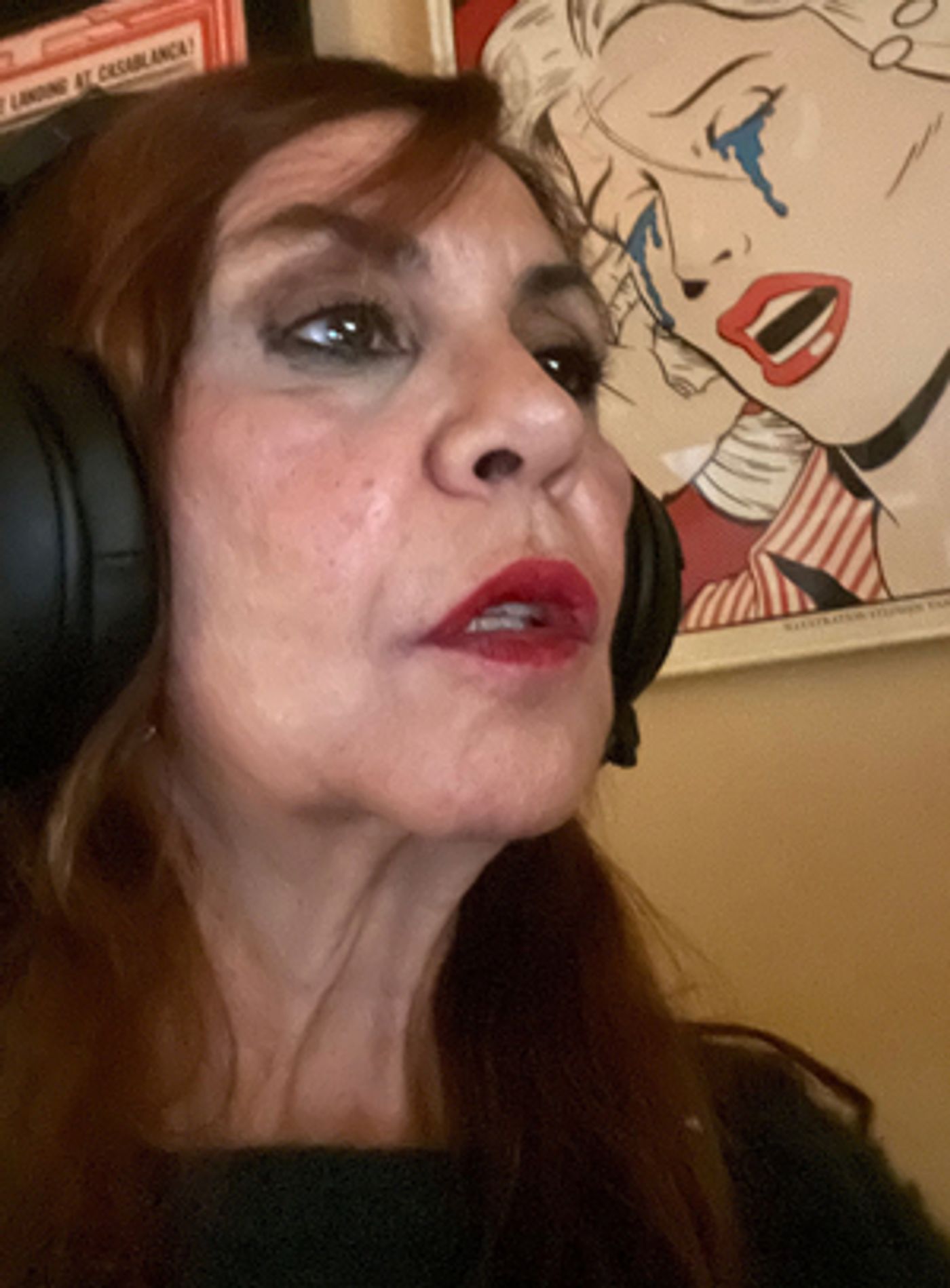 (Pictured) Jade Hykush records 91754: Monterey Park "Bingo Bitches" - Photo courtesy Antaeus Theatre Company
(Pictured) Jade Hykush records 91754: Monterey Park "Bingo Bitches" - Photo courtesy Antaeus Theatre Company
Speaking of luck, [Antaeus co-artistic director] Bill Brochtrup connected me to Jade, our third actor, and she is a revelation as our 103-year-old grand dame, even though she is most definitely not 103 in real life! It was just a dream working with these women.
(Shari): With bingo being such a universal game of chance across cultures, especially at churches, senior centers, and casinos, these women certainly add a lot of unexpected naughtiness to the game as well as a lot of superstitions about how to increase their luck at winning. Have you ever played bingo or gone to games while doing research for this play? Did you notice similar things going on among the players, such as good luck charms or a belief in lucky seats? I think those are some of the universal appeals of gambling!
 Cici Lau (pictured) records 91754: Monterey Park "Bingo Bitches" - Photo courtesy Antaeus Theatre Company
Cici Lau (pictured) records 91754: Monterey Park "Bingo Bitches" - Photo courtesy Antaeus Theatre Company
The other two Zip Code Plays in Season Two include:
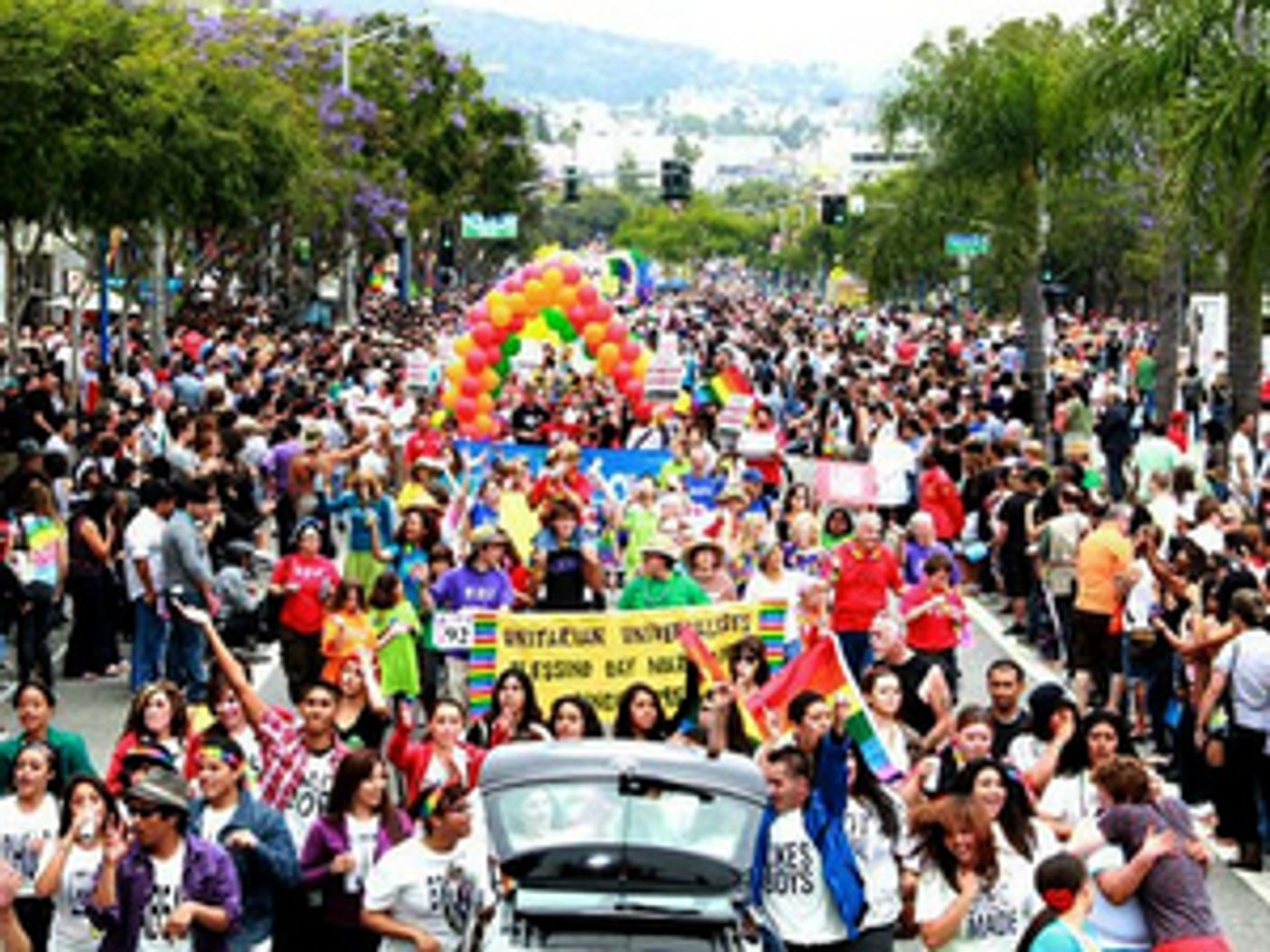 In 90069: West Hollywood, "Brunch, Interrupted," we travel to WeHo, where nearly 40% of the population currently identifies as LGBTQ. In Sean Abley's provocative and hilarious play, directed by Michael A. Shepperd, Joe (Bill Brochtrup) and Moses (Parnell Damone Marcano) are an interracial gay couple "of a certain age" setting up for a fundraiser outside their favorite queer bar. Questions about privilege, code switching, daytime drag and who is really colonizing whom burst like an overstuffed piñata when the two are unexpectedly confronted by a new, straight neighbor (Anne Gee Byrd).
In 90069: West Hollywood, "Brunch, Interrupted," we travel to WeHo, where nearly 40% of the population currently identifies as LGBTQ. In Sean Abley's provocative and hilarious play, directed by Michael A. Shepperd, Joe (Bill Brochtrup) and Moses (Parnell Damone Marcano) are an interracial gay couple "of a certain age" setting up for a fundraiser outside their favorite queer bar. Questions about privilege, code switching, daytime drag and who is really colonizing whom burst like an overstuffed piñata when the two are unexpectedly confronted by a new, straight neighbor (Anne Gee Byrd). 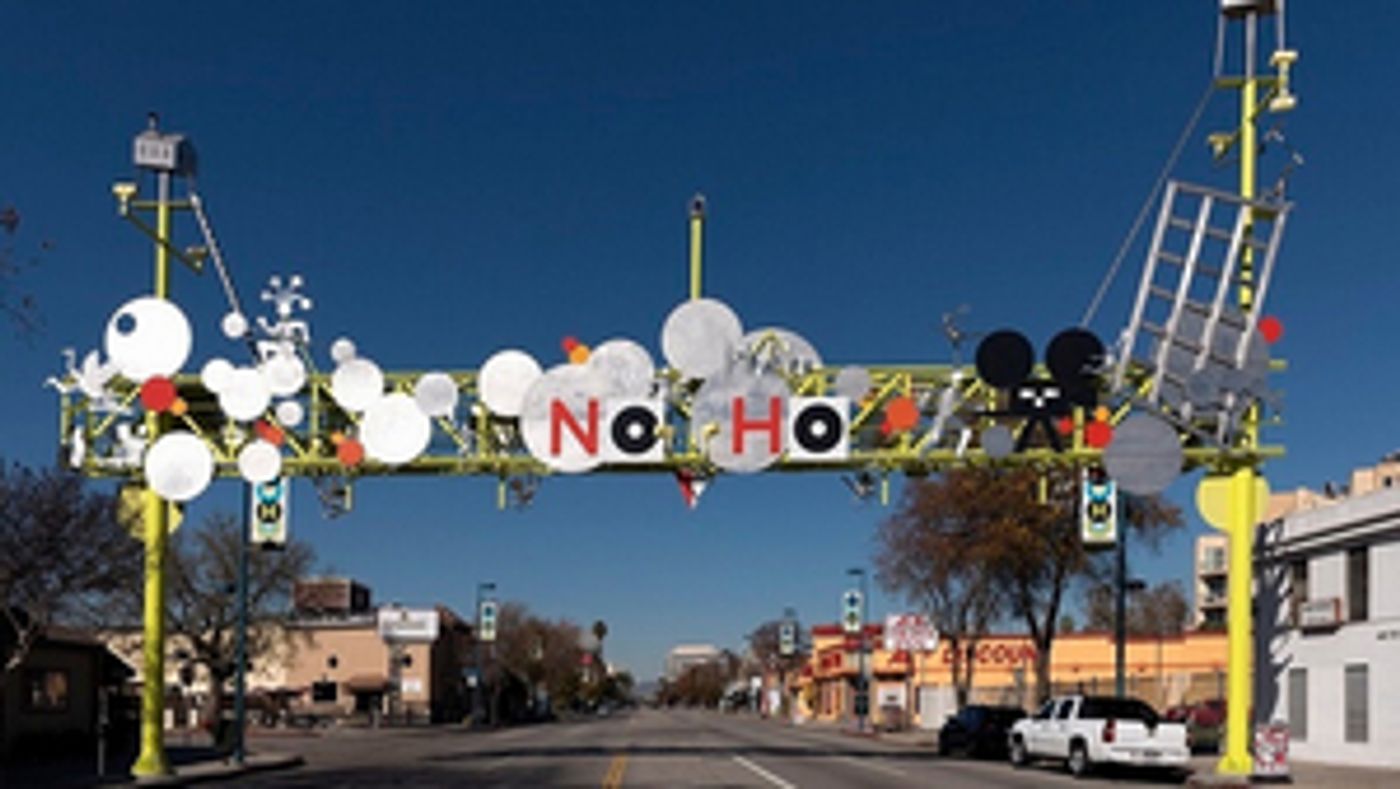 Watching the world go by from her balcony in 91601: North Hollywood "End of the Line," self-appointed "detective" Aimee-Lynn is a curious observer of the goings-on in her local NoHo neighborhood. But when a suspicious incident occurs on the street below, Aimee-Lynn's worldview is changed forever in this dramedy about the duality that exists right before our eyes - if we can see it. Written by Peppur Chambers, and featuring Tamarra Graham, Mildred Marie Langford and Rob Nagle, this episode is directed by Gregg T. Daniel.
Watching the world go by from her balcony in 91601: North Hollywood "End of the Line," self-appointed "detective" Aimee-Lynn is a curious observer of the goings-on in her local NoHo neighborhood. But when a suspicious incident occurs on the street below, Aimee-Lynn's worldview is changed forever in this dramedy about the duality that exists right before our eyes - if we can see it. Written by Peppur Chambers, and featuring Tamarra Graham, Mildred Marie Langford and Rob Nagle, this episode is directed by Gregg T. Daniel.
I hope readers will tune in for these six most interesting stories about culturally diverse areas in the greater Los Angeles area. You can hear Season Two of The Zip Code Plays: Los Angeles podcast series for free at www.Antaeus.org, or wherever you get your podcasts, beginning Thursday, May 20, 2021.
Videos

